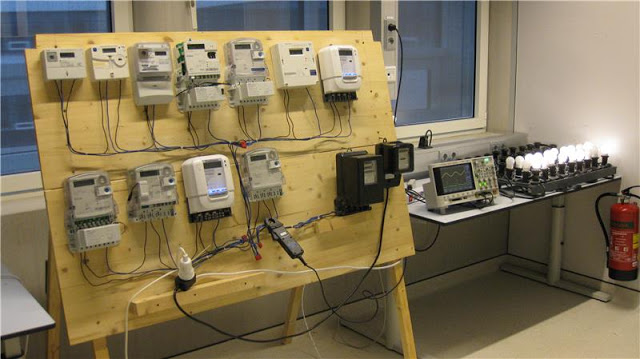

| Online: | |
| Visits: | |
| Stories: |

| Story Views | |
| Now: | |
| Last Hour: | |
| Last 24 Hours: | |
| Total: | |
Smart Meters False Readings Up to 582% Higher Than Actual Power Use
Some electronic energy meters can give false readings that are up to 582% higher than actual energy consumption. This emerged from a study carried out by the University of Twente (UT), in collaboration with the Amsterdam University of Applied Sciences (AUAS). Professor Frank Leferink of the UT estimates that potentially inaccurate meters have been installed in the meter cabinets of at least 750,000 Dutch households. The is published in the scientific journal ‘IEEE Electromagnetic Compatibility Magazine’.
In the Netherlands, traditional energy meters (kWh) – the familiar energy meter with a rotating disc – are being increasingly replaced by electronic variants (which are also known as ‘static energy meters’). One well-known variant of the latter is the ‘smart meter’. The Dutch government wants smart meters in every household by 2020.
Actual consumption
For quite some time now, rumours have been rife about electronic energy meters that give excessively high readings in practice. This prompted Prof. Leferink to investigate electronic meters, to see whether they can indeed give false readings. Together with co-workers Cees Keyer and Anton Melentjev from AUAS, he tested nine different electronic meters in this study. The meters in question were manufactured between 2004 and 2014. The meters were connected, via an electric switchboard, to a range of power-consuming appliances, such as energy saving light bulbs, heaters, LED bulbs and dimmers. The researchers then compared the actual consumption of the system with the electronic energy meter’s readings.
582 percent
In the experiments (which were entirely reproducible), five of the nine meters gave readings that were much higher than the actual amount of power consumed. Indeed, in some setups, these were up to 582 percent higher. Conversely, two of the meters gave readings that were 30 percent lower than the actual amount of power consumed.
The greatest inaccuracies were seen when dimmers combined with energy saving light bulbs and LED bulbs were connected to the system. According to Mr Keyer (lecturer Electrical Engineering at the AUAS and PhD student at the UT) “OK, these were laboratory tests, but we deliberately avoided using exceptional conditions. For example, a dimmer and 50 bulbs, while an average household has 47 bulbs.”
Explanation
The inaccurate readings are attributed to the energy meter’s design, together with the increasing use of modern (often energy-efficient) switching devices. Here, the electricity being consumed no longer has a perfect waveform, instead it acquires an erratic pattern. The designers of modern energy meters have not made sufficient allowance for switching devices of this kind.
When they dismantled the energy meters tested, the researchers found that the ones associated with excessively high readings contained a ‘Rogowski Coil’ while those associated with excessively low readings contained a ‘Hall Sensor’. Frank Leferink (Professor of Electromagnetic Compatibility at the UT) points out that “The energy meters we tested meet all the legal requirements and are certified. These requirements, however, have not made sufficient allowance for modern switching devices”.
Consumers
Any consumers who do not trust their energy meter can have it tested by an ‘Accredited inspection company’. However, if this inspection shows that the meter is functioning properly, then the consumer will have to cover the costs involved. Yet the standardized test does not make allowance for waveform-contaminating power-consuming appliances. As a result, according to the researchers, it is an unsuitable method for detecting false meter readings. Prof. Leferink and Mr Keyer advise any consumers who doubt their meter readings to contact their supplier, who then will pass the complaint on to the power grid operator.
Study
The study, entitled ‘Static Energy Meter Errors Caused by Conducted Electromagnetic Interference’, are published in the scientific journal ‘IEEE Electromagnetic Compatibility Magazine’. The Van Swinden Laboratory (the Dutch Metrology Institute), which carried out a countercheck, has confirmed these results. The study was conducted by Prof. Frank Leferink (Professor of Electromagnetic Compatibility at the UT), Cees Keyer (lecturer at the AUAS and PhD candidate at the UT), and Anton Melentjev (at that time, a student at the AUAS).
Contacts and sources:
Citation: Static Energy Meter Errors Caused by Conducted Electromagnetic Interference;
Frank Leferink, Cees Keyer, Anton Melentjev;
IEEE Electromagnetic Compatibility Magazine Volume 5, Quarter 4
Source: http://www.ineffableisland.com/2017/03/smart-meters-false-readings-up-to-582.html





You say energy efficient devices are causing problems
The problems are additional harmonics
You say energy no longer has a perfect waveform
This is referred to as harmonic distortion
The greatest culprit in this is wind turbines
Our electricity supply is 50/60Hz
Turbines do not produce 50/60Hz
They produce any harmonic but 50/60
Smart meters are reading additional harmonics and adding them to consumers power accounts
The whole wind turbine industry is one giant fraud
I would like to see more tests carried out
Please inform me of the results